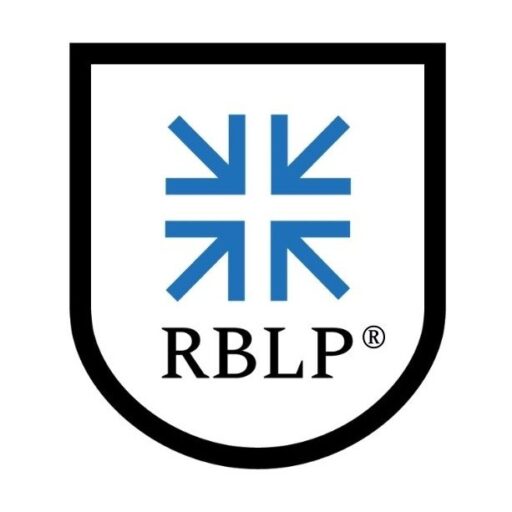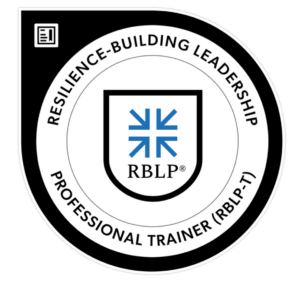RBLP Trainer Certification
People who earn the Resilience-Building Leadership Professional Trainer (RBLP-T) certification are resilient leaders who can build and lead resilient teams. They coach their teams to solve problems, implement change, continuously improve, and innovate in the workplace. They help build resilient organizations that can learn and change.
The American Council on Education (ACE) recommends three (3) semester hours of credit at the upper-division baccalaureate level in Applied Leadership for the RBLP Trainer certification exam.
People who earn and maintain the RBLP Trainer certification may use the RBLP-T designation and describe themselves as RBLP Trainer certified.
RBLP Trainer certified leaders can use the Resilience-Building Leadership Framework to create leader development programs in their organizations.
RBLP-T certified leaders are also eligible to become Authorized Training Partners (ATPs) and provide exam prep training (oral exam rehearsal) for the RBLP Leadership Certifications.
Get Started – Apply for Certification
Our application is free and takes less than 10 minutes to complete.
RBLP Support will contact you about next steps for training and certification.
Average cost of exam prep training: $595 | Certification exam fee: $995
RBLP Trainer Certification
Requirements
RBLP-T is our leadership certification for senior managers. In any organization, senior managers are responsible for driving long-term growth, aligning operations, and ensuring the organization’s overall vision and goals are met. They typically have considerable experience in their field of work. They can oversee programs, large departments, or multiple departments.
Senior managers are responsible for fostering organizational learning by encouraging a culture of continuous improvement and innovation. They identify and promote best practices, support professional development programs, and drive initiatives that help the organization adapt to evolving market demands.
To earn the RBLP-T certification, you must complete at least five hours of instructor-led, certification prep training (oral exam rehearsal) and pass the 2.5-hour oral exam.
During the certification exam, you will be assessed on your knowledge, skills, and experience in the competency domains below.
RBLP Trainer Certification
Competency Domains
Team Climate
Climate is the shared perceptions about attitudes and emotions that define a team. Climate can shift quickly based on the actions of leaders and team members. While culture reflects the deeper values and beliefs of an organization and changes only over time, climate is more immediate and directly felt. Positive climates are characterized by supportive attitudes and constructive emotions. Creating a positive climate improves morale, fosters creativity, and makes people more open to new ideas. Creating a positive climate strengthens problem-solving, adaptability, and resilience, even when the broader organizational culture may not be ideal.
Leader Task 1: Analyze team climate.
- Know why creating a positive climate improves morale.
- Know why creating a positive climate builds resilience.
- Know what a positive team climate is.
Leader Task 2: Earn trust.
- Know why earning trust is important.
- Know how to earn trust.
- Know what authenticity is.
Leader Task 3: Treat people with respect.
- Know why treating people with respect is important.
- Know how to treat people with respect.
- Know what active listening is.
Leader Task 4: Enforce accountability.
- Know why enforcing accountability is important.
- Know how to enforce accountability.
Leader Task 5: Encourage people to have fun.
- Know why having fun at work is important.
- Know how to encourage people to have fun at work.
Leader Task 6: Manage expectations about adversity.
- Know why managing expectations about adversity is important.
- Know how to manage expectations about adversity.
- Know what proactive coping is.
Leader Task 7: Be there when the going gets tough.
- Know why being there when the going gets tough is important.
- Know how to be there when the going gets tough.
Team Cohesion
Cohesion is the bond that keeps a team united and committed, even in the face of adversity. It develops through collaboration, mutual support, and the trust that comes from depending on one another. Cohesion has two dimensions: social cohesion, which reflects the strength of relationships and sense of solidarity among team members, and task cohesion, which reflects how effectively a team works together to achieve shared goals. Both evolve over time, strengthening teamwork and resilience. When teams are cohesive, they are more flexible, creative, and capable of solving problems and overcoming challenges together.
Leader Task 1: Analyze team cohesion.
- Know why developing cohesion improves teamwork.
- Know why developing cohesion builds resilience.
- Know what social cohesion is.
- Know what task cohesion is.
Leader Task 2: Organize people to work in teams.
- Know why working in teams is important.
- Know how to organize people to work in teams.
- Know what shared leadership is.
Leader Task 3: Promote trust between team members.
- Know why promoting trust between team members is important.
- Know how to promote trust between team members.
Leader Task 4: Ensure mutual respect between team members.
- Know why mutual respect between team members is important.
- Know how to ensure mutual respect between team members.
Leader Task 5: Keep the team informed.
- Know why keeping the team informed is important.
- Know how to keep the team informed.
Leader Task 6: Keep people focused on the mission during adversity.
- Know why keeping people focused on the mission during adversity is important.
- Know how to keep people focused on the mission during adversity.
Leader Task 7: Talk about setbacks.
- Know why talking about setbacks is important.
- Know how to talk about setbacks.
Individual Purpose
Purpose is the desire and determination that drives people to create a meaningful and fulfilling future, often through their work. In the workplace, providing purpose means enabling individuals to reach their full potential by supporting both personal and professional growth. Leaders play a key role by challenging people to develop the skills, knowledge, and experience that enrich their lives and careers, while also connecting their contributions to the organization’s larger goals. When people feel a sense of purpose, they are more motivated, committed, and resilient – better able to solve problems, adapt to challenges, and embrace new ideas.
Leader Task 1: Analyze individual purpose.
- Know why challenging people to reach their full potential provides purpose.
- Know why providing purpose improves motivation and commitment.
- Know why providing purpose builds resilience.
Leader Task 2: Demonstrate character.
- Know why demonstrating character is important.
- Know how to demonstrate character.
Leader Task 3: Show genuine concern for people.
- Know why showing genuine concern for people is important.
- Know how to show genuine concern for people.
Leader Task 4: Encourage individual learning.
- Know why encouraging individual learning is important.
- Know how to encourage individual learning.
- Know what a growth mindset is.
Leader Task 5: Delegate responsibility.
- Know why delegating responsibility is important.
- Know how to delegate responsibility.
Leader Task 6: Empower decision-making.
- Know why empowering decision-making is important.
- Know how to empower decision-making.
Leader Task 7: Train the team.
- Know why training the team is important.
- Know how to train the team.
- Know what collective efficacy is.
Team Learning
Work is a team sport. Team learning is a continuous cycle of experiencing, reflecting, deciding, and acting together to improve, innovate, and solve problems. Leaders coach their teams through this cycle of experiential learning. Every experience a team has can be learned from by reflecting on what happened and why. This critical examination then informs decision-making about what needs to change. Those decisions are followed by action, where teams put plans into motion. This cycle repeats as each action creates new experiences, ensuring that learning never stops. Team learning is the foundation of organizational learning.
Leader Task 1: Analyze team learning capacity.
- Know how teams learn from experience to improve, innovate, and solve problems.
- Know what happens during the experiencing stage
- Know what happens during the reflecting stage.
- Know what happens during the deciding stage.
- Know what happens during the acting stage.
Leader Task 2: Set collective goals for teams.
- Know why collective goals are important for teams.
- Know how stretch goals drive improvement, innovation, and problem-solving.
- Know what stretch goals are.
Leader Task 3: Encourage constructive dialogue.
- Know why constructive dialogue is important for teams.
- Know how psychological safety makes constructive dialogue possible.
- Know what psychological safety is.
Leader Task 4: Build new mental models.
- Know why mental models are important for teams.
- Know how entrenched mental models impact improvement, innovation, and problem-solving.
- Know what single-loop learning is.
- Know what double-loop learning is.
Organizational Learning
Learning is how organizations gain and maintain a competitive advantage. Organizational learning enables teams and organizations to continuously improve and innovate. Continuous improvement focuses on enhancing existing products, services, or processes, while innovation creates entirely new ones. Together, these practices allow organizations to adapt more quickly than competitors, which is the surest path to long-term success. Because meaningful organizational change requires the ability to learn, the process begins at the team level – where people build the skills, insights, and adaptability needed to move from the current state to a desired future state.
Leader Task 1: Analyze organizational learning capacity.
- Know why team learning is the foundation of organizational learning.
- Know how learning creates competitive advantage in organizations.
- Know why organizational change is not possible without learning.
- Know what competitive advantage is.
- Know what organizational change is.
Leader Task 2: Promote a shared vision.
- Know why vision is important for organizations.
- Know how vision drives learning and change in organizations.
- Know how organizations realize their visions.
- Know what vision is.
- Know what culture is.
- Know what strategy is.
Leader Task 3: Foster knowledge creation.
- Know why the best new ideas often come from frontline workers and supervisors.
- Know why leaders should encourage and reward creativity.
- Know how challenging the status quo fosters knowledge creation.
- Know what status quo means.
Leader Task 4: Ensure knowledge sharing.
- Know how sharing knowledge ensures that it becomes a collective resource.
- Know how entrenched mental models impact knowledge sharing.
- Know why communities of practice are especially effective at sharing knowledge.
- Know how organizations can support communities of practice.
- Know what a community of practice is.

